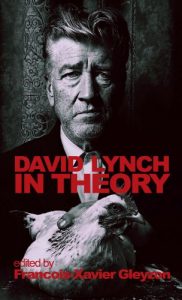David Lynch: In Theory together a brilliant set of critical essays on the iconic hero of lost forms, with important contributions by Todd McGowan, Greg Hainge, Gary Bettinson, Dominique de Courcelles, Scott Wilson, Alanna Thain, Jason T. Clemence, Joshua D. Gonsalves, Rebecca Anne Barr, Louis Armand, Eric G. Wilson, Francois-Xavier Gleyzon, Gary Bettison, Michel Chion.
"Probing, fearless and scrupulous, the volume stays close to the pained exactitude of an unrelenting oeuvre, strongly supporting its troubled and abjected areas, the glacial vocabularies and spectral prods that have made Lynch unbypassable, necessary and enduring."
--Avital Ronell, New York University
"David Lynch in Theory takes us deeper into the heart of Lynch's art than the artist himself ever could, because it registers not only the seismic shudders and wild eclecticism of his studio practices, but traces the effects of his work on the sensoria of a brilliantly selected array of critical perspectives. This marvelous collection will be required reading for any further study of Lynch's art."
--W. J. T. Mitchell, University of Chicago
"Francois-Xavier Gleyzon's new collection of essays on David Lynch makes a compelling case for the urgency of Lynch's work, today more than ever. These lucid interrogations of Lynch's unfolding oeuvre, including essays by some of the very best psychoanalytic and philosophical film critics, stitch together the pieces of a fantasy in which Eraserhead feels as contemporary as Inland Empire. Essential reading for scholars and students working in film and theory, and those of us whose waking dreams are haunted by snatches of sound and light from Lynch's singular art."
--Kenneth Reinhard, UCLA
"This stunning collection of twelve essays and an interview with Michel Chion can be likened to as many shock waves cutting through David Lynch's cinema and photography. Each and every one informed by critical methods up to speed with the work, the essays become, in the strong sense of the term, events. Some touch on electric attraction and breakage, others on the ghost-like nature of the cinema, others on creative abjection and fetishism. Written by experts, filmmakers and artists, all discern, as Chion notes in the final pages, the strong degree to which Lynch is a commanding auteur of our time. Francois-Xavier Gleyzon is to be congratulated for having engineered an explosive work that opens Lynch and film theory onto unforeseen lines of inquiry."
--Tom Conley, Harvard University
"Probing, fearless and scrupulous, the volume stays close to the pained exactitude of an unrelenting oeuvre, strongly supporting its troubled and abjected areas, the glacial vocabularies and spectral prods that have made Lynch unbypassable, necessary and enduring."
--Avital Ronell, New York University
"David Lynch in Theory takes us deeper into the heart of Lynch's art than the artist himself ever could, because it registers not only the seismic shudders and wild eclecticism of his studio practices, but traces the effects of his work on the sensoria of a brilliantly selected array of critical perspectives. This marvelous collection will be required reading for any further study of Lynch's art."
--W. J. T. Mitchell, University of Chicago
"Francois-Xavier Gleyzon's new collection of essays on David Lynch makes a compelling case for the urgency of Lynch's work, today more than ever. These lucid interrogations of Lynch's unfolding oeuvre, including essays by some of the very best psychoanalytic and philosophical film critics, stitch together the pieces of a fantasy in which Eraserhead feels as contemporary as Inland Empire. Essential reading for scholars and students working in film and theory, and those of us whose waking dreams are haunted by snatches of sound and light from Lynch's singular art."
--Kenneth Reinhard, UCLA
"This stunning collection of twelve essays and an interview with Michel Chion can be likened to as many shock waves cutting through David Lynch's cinema and photography. Each and every one informed by critical methods up to speed with the work, the essays become, in the strong sense of the term, events. Some touch on electric attraction and breakage, others on the ghost-like nature of the cinema, others on creative abjection and fetishism. Written by experts, filmmakers and artists, all discern, as Chion notes in the final pages, the strong degree to which Lynch is a commanding auteur of our time. Francois-Xavier Gleyzon is to be congratulated for having engineered an explosive work that opens Lynch and film theory onto unforeseen lines of inquiry."
--Tom Conley, Harvard University






